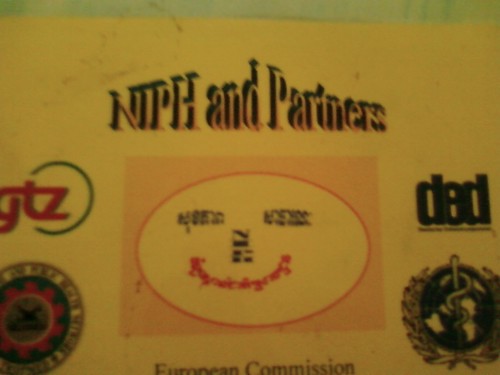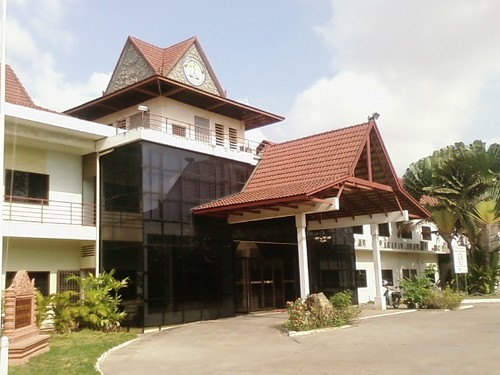Scene in Phnom Penh
 My view from the treadmill at the gym. Running east towards the Mekong River (which is at the top of this photo) is Sihanouk Blvd. Independence Monument, commemorating the war dead and independence from colonial rule (France) in 1953, is at the intersection with Norodom Blvd. The parks on either side of the monument are hubs of activity.
My view from the treadmill at the gym. Running east towards the Mekong River (which is at the top of this photo) is Sihanouk Blvd. Independence Monument, commemorating the war dead and independence from colonial rule (France) in 1953, is at the intersection with Norodom Blvd. The parks on either side of the monument are hubs of activity.
The street grid under French rule composed of wide main boulevards lined with trees. Fortunately the not-so-often wise leadership decided that this is an asset. The municipality has recently begun a spate of beautification projects around the city, making medians more inviting and family-friendly like this one. It’s part of a wider effort at attracting tourism, as most visit the country for just three days– all three of which is spent in Siem Reap’s Angkor Wat archeological zone.
Websites for Khmer Rouge tribunal updates
A few people have asked for some news feeds of the proceedings, now that the Khmer Rouge tribunal has finally begun. Here are some blogs, news coverage and expert commentaries on the Extraordinary Chamber in the Courts of Cambodia (ECCC):
Cambodia Tribunal Monitor, with webcasts of the proceedings and video commentaries, by Western legal and academic experts on the Khmer Rouge or Genocide.
Ka-set is the Khmer-ization of the French word for newsmagazine. This news website aims to promote quality journalism, and is a project started by four journalists (Cambodian, French and Belgian), affiliated with Cambodge Soir (French-language newspaper in Phnom Penh), in 2007.
Documentation Center of Cambodia is a rights group advocating for greater access to information.
From the Phnom Penh Post (the English language newspaper of Phnom Penh) is the Khmer Tribunal Report, a blog on progress at the ECCC.
This is the official site of the Extraordinary Chamber of the Courts in Cambodia (ECCC), in English, Khmer and French. Unfortunately it is down quite often (but that may just be for connections in Cambodia).
And here is the controversial website of Ieng Sary’s defense. It fuels debate about confidentiality in the UN-backed court. Ieng Sary was the former Khmer Rouge’s Foreign Minister.
.
what liberal media bias? ;-)
And here I thought there’d be no fodder for comedy under an articulate, competent African-American president! Not that I’m a Democrat, but the GOP sure is providing a good stream of material these days!
Rachel Maddow on (what I didn’t know was a liberal-leaning) MSNBC about Bush and Cheney being wanted men in the State of Vermont. It’s the only state not visited by Bush during his administration… 06 Feb 2009
Jon Stewart eviscerates Rick Santelli and CNBC 05 Mar 2009
(@jayrosen_nyu) Rush as the face of the GOP brand. Good for the Democrats. “No, I am” Steele says. Better! “No, social conservatives are the brand.” BEST. LOL!!! 28 Feb 2009
logo redesign
The new and much improved logo for NIPH (National Institute for Public Health):
It’s a vast improvement over the old one, which I cannot find a trace of anywhere now to take a good photo of it (I’d burn all instances of it too if I were the director!): 
This is the main building in the NIPH compound. I can’t tell you how happy I am not to have to see that silly-looking smiley face logo whenever I walked into the office!
The German-Cambodian Technical Cooperation supported the NIPH since 1996 and now it’s aiming for accreditation as a higher learning institution. It’s a long process, so for now NIPH is seeking accreditation to national standards (these criteria not yet defined in Cambodia), then down the road (way down the road) is international accreditation.
Dialogue and the Khmer Rouge tribunals
 Photo courtesy of the Far Eastern Economic Review, article cited below.
Photo courtesy of the Far Eastern Economic Review, article cited below.
One of the recurrent topics at a meditation group in Boeng Keng Kang with some teens is the culpability of the Khmer Rouge soldiers. The KR period is not a dialogue that younger generations born after the atrocities actively engage in. It’s a concern of many advocates and the international community here that some young adults are ignorant of the fact that it ever even occurred. There are several factors at work.
One is that while a lot of aid is allocated to feel-good causes taxpayers back home like, eg HIV, private sector development, democratisation, conservation etc, there is little committed to other needs, like mental health. It just isn’t sexy enough. So despite the high prevalence of PTSD (so soon post-conflict), the advocacy and attention given this problem and opening a greater dialogue or forum has no momentum.
Another complaint, which has been gaining more voice, is the lack of efforts to educate Khmers on the significance and progress of the KR tribunal. The tribunal finally began after years of setbacks and conflicts. But for many, it’s almost as if the trials are a matter of course rather than for the benefit of the Khmers. There’s no shortage of interns, academics and legal aids pouring into the country from abroad, each coming with high fees and expenditures. But to host townhall meetings, debates or panels?– the efforts are sparse.
It’s truly a wasted opportunity. Khmers emerged from this period with a cultural identity crisis. The country is caught up in a rapid development pace that even this global crisis won’t impact as much as other countries of similar development stage. Teens affiliate more with “western” culture than with their own, in the quest to modernise and westernise as quickly as possible, while elements of their heritage and traditions are increasingly lost.
The meditation group (impressively) discussed the culpability factor, when executioners are under orders on threat of a gruesome death themselves. And to see these kids crying after being told (by foreigners) of the facts of their history that their elders won’t discuss with them (understandably to a certain level).. it’s unsettling.
Recently these articles appeared in the NY Times that addressed this culpability issue. How do you mete out justice to the pee-ons while elements of the Khmer Rouge still sit in the current administration?
Trials in Cambodia Expose the Cogs in a Killing Machine
At Trial, a Plea for Rights of a Khmer Prison Official.
Locally, thanks in part to people like Chea Vanthan and arts communities like at Meta House, there has been increased advocacy to engage young people in this very important dialogue about their history. And since the tribunals have begun, people are now starting to engage.
On the political level, from the Far Eastern Economic Review is a good article on the issues plaguing the legitimacy of the tribunals: Judging the Khmer Rouge Tribunal. Some of author John Hall’s recommendations:
1) Limit opportunities for political interference in judicial decision making.
2) Create an independent investigation mechanism for accusations of wrongdoing.
3) Human rights monitors, NGOs and reporters must be allowed to keep their sources confidential.
4) Ensure adequate whistleblower protections for those reporting wrongdoing.
